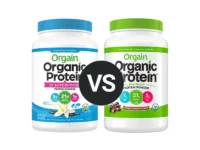Knowledge BaseYou're Questions Answered
How does protein powder impact hormones and hormonal imbalances?
Protein powders can influence hormone levels in the body, but the effects largely depend on the type of protein, the overall diet, and individual health conditions. Proteins are essential components of hormones, and consuming adequate amounts is crucial for maintaining healthy hormonal functions.
For example, whey protein influences the production of hormones such as insulin and glucagon. Whey protein can help increase insulin levels temporarily, which can be beneficial for muscle growth by promoting glucose uptake and amino acid absorption. This is particularly useful post-exercise1. However, for individuals with insulin resistance or conditions like PCOS, this insulinogenic effect may require careful management under medical guidance2.
Additionally, protein intake can affect the levels of hormones that control appetite, such as ghrelin and leptin. High protein diets have been shown to reduce ghrelin levels, the hormone responsible for stimulating hunger, and can increase leptin, which signals satiety to the brain. This can help in regulating food intake and aiding in weight management3.
It's also important to consider that excessive protein intake, beyond what your body needs, can lead to hormonal imbalances, particularly if it displaces other essential nutrients in the diet. Balance and moderation are key, and it's advisable for individuals to consume protein in accordance with their specific health needs and activity levels4.
- Pal, S., & Ellis, V. (2010). The acute effects of four protein meals on insulin, glucose, appetite and energy intake in lean men. British Journal of Nutrition, 104(8), 1241-1248.
- Marsh, K. A., Steinbeck, K. S., Atkinson, F. S., Petocz, P., & Brand-Miller, J. C. (2010). Effect of a low glycemic index compared with a conventional healthy diet on polycystic ovary syndrome. The American Journal of Clinical Nutrition, 92(1), 83-92.
- Leidy, H. J., Tang, M., Armstrong, C. L., Martin, C. B., & Campbell, W. W. (2011). The effects of consuming frequent, higher protein meals on appetite and satiety during weight loss in overweight/obese men. Obesity, 19(4), 818-824.
- Hoffman, J. R., & Falvo, M. J. (2004). Protein – Which is Best? Journal of Sports Science and Medicine, 3(3), 118-130.
Related Questions
Related Reviews

Your Answer
We are a participant in the Amazon Services LLC Associates Program, an affiliate advertising program designed to provide a means for us to earn fees by linking to Amazon.com and affiliated sites.



